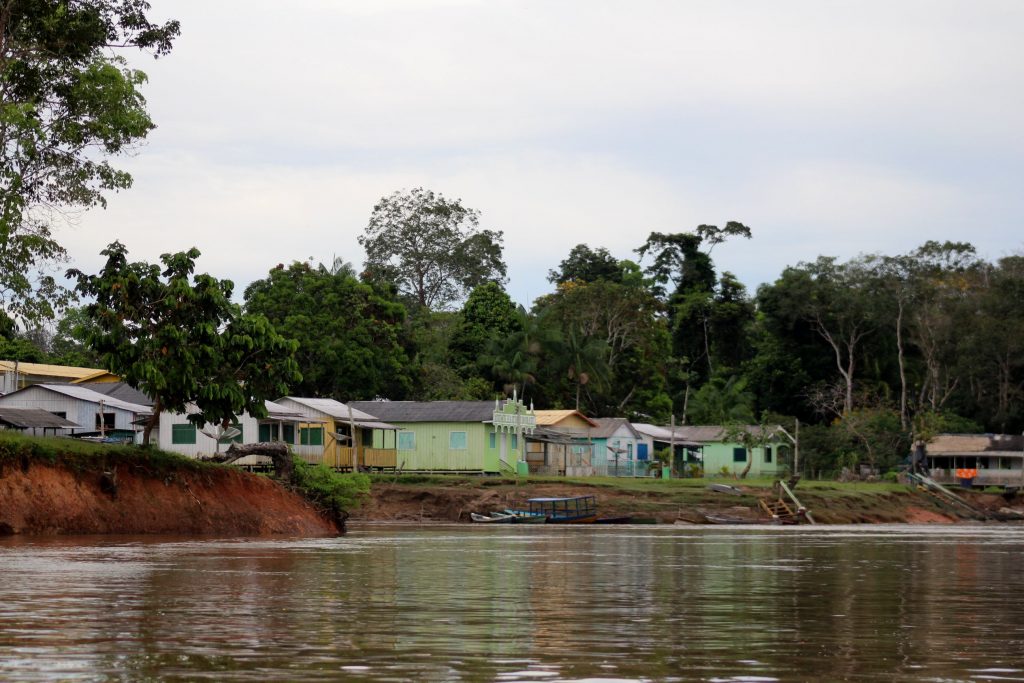The unfolding story of COVID-19 in the Amazon rainforest

Coronavirus really does know no bounds
Earth Rewards supports Trocano: an avoided deforestation project within the municipal boundaries of Borba, Amazonas. The project covers an area of 1.3 million hectares which is inhabited by over 10,000 people across 100+ communities.
The centre of this municipality is the town of Borba, which has a population of around 30,000 people and is considered well developed compared to similar municipalities. It is situated on the Madeira River, and approx. 150km from Manaus, the capital city of Amazonas.
Much has been covered in the press on the devastation caused by COVID-19 in Manaus, but not so much about the outlying municipalities.
It is therefore important to share a timeline of the development of the disease within Borba. Although this isn’t covered or shared in mainstream media, it’s important that we are aware of the situation in an under-reported area.
Timeline of the situation in Borba, Amazonas
24th February: the first night of the annual parades celebrating Borba Folia 2020 went ahead as usual. Rumours of COVID-19 were spoken of but there was no sense of the pandemic reaching them in the municipality.
29th February: 2020 is the year of school regeneration in Borba, and the Trocano project, with the help of Earth Rewards hopes to play a major role in the funding of this great initiative.
On this day, the Pajé Raimundo Moreira School on the Mari Mari River was inaugurated. This school caters for Elementary and High School students of the indigenous village, Mucajá.
The event was attended by the majority of the local community and many from the Borba town population. There was little fear or apprehensions of COVID-19.
16th March: with great anticipation, the Mundoca Hospital in the town of Borba opened its extension. The hospital caters for the population of Borba Town, the outlying and indigenous communities. Particular excitement was focused around the mini-ICU facility which can be used to stabilise patients waiting for the ICU aeroplane transport to Manaus. This was urgently needed as there is only one ICU plane available to transport critically ill patients from over 62 municipalities.
Due to it’s distance from Manaus, there were no real concerns voiced on COVID-19 and the town felt it was well-prepared.
Yet, it was agreed that the activities of the Trocano project would temporarily cease, especially in the more isolated communities to avoid any risk of spread. The Secretary for Environment and the Secretary for Tourism and Nature would keep updates on any areas of concern within the project area, during these unprecedented times.
Unfortunately between this date and the 19th March, the reality of the threat became real as new information reached the town of the devastation being wreaked on Manaus. An emergency meeting of the Town Council was called; a decree was signed stipulating all events of groups with more than 20 people were suspended until further notice.
No cases had been reported at this time and prevention was still the prevailing objective.
The threat was about to become a reality
On 20th March, people arriving in the municipality began to be screened at the port and entry points.
23rd March, the first suspected case in Borba flagged up and stay at home advice was immediately announced.
5 days later, on the 28th March, the problem seems to accelerate and 30 people were placed in self-isolation with a 90% certainty of 1 suspected case.
Efforts were ramped up and the Mayor issued a decree suspending all transport to and from the municipality for 15 days. This decision was overturned within 24 hours by the State Adjudicator as it was deemed unconstitutional.
3rd April, messaging was stepped up for social distancing, hygiene and stay at home advice. 20 further people were put into self-isolation.
By 16th April, there were 112 people in self-isolation with 2 suspected cases.
21st April, the hospital increased preparation by adding 10 extra adult beds and 2 children’s beds in the special COVID-19 area of the hospital. Extra members of medical staff were drafted in from other towns and retired medical staff within the municipality.
The supply of PPE levels were increased and requests to State and Federal authorities sent. Food bags were distributed to school students registered as socially vulnerable.
There were now 107 people in self-isolation with 2 suspected cases – test results were still awaiting arrival from Manaus.
5 days later, the 26th, the first 2 positive cases were confirmed and 1 day later, a third was confirmed.
On 28th April, the first Covid death was announced – an 85 year old male.
The municipality made an effort to purchase additional PPE on the open market, but what was BRL $14 per dozen, was now USD $140. 5 seamstresses committed to manufacture 5,000 masks and every household given instruction on the manufacture and care of masks.
1st May, a ban on travel to the outlying communities – many of which are within the Trocano project area – was initiated. Only the supply of essential goods and medical care was permitted.
2nd May, there were 8 confirmed cases. A week later, this increased to 40 confirmed cases and 6 deaths.
The annual celebration of Saint Anthony (patron saint of Borba) was cancelled and the apprehension increased.
By 14th May, 55 cases 7 deaths. The stay at home order was starting to negatively affect the population, so a massive ramping up of food parcel deliveries began, both within the town as well as the outlying communities.
By 20th May, there were 160 confirmed cases and the death toll increased to 9.
21st May, a curfew was initiated from 9pm to 6am.
On 23rd May, the numbers increased to 173 confirmed cases, with 11 deaths.
On 27th May, a new milestone was reached, with 200 confirmed cases, 10 of which were from indigenous communities and the first signs of the spread outside of Borba town began.
On this day SEMSA teams with quick testing kits were sent to 3 indigenous villages where it was known that some contact with Covid-positive people had occurred. Similar teams were sent to remote communities for rapid testing.
By 29th May, there were 226 confirmed cases, 13 of these indigenous; 12 deaths, including the first indigenous death.
3rd June, the numbers began to increase significantly with 275 confirmed cases (24 indigenous) 14 deaths (2 indigenous people).
With the numbers showing no sign of a slowdown, on 7th June the curfew was extended to be from 7.30pm to 6am.
By 19th June, the figures had increased to 360 confirmed cases with 16 deaths but no additional deaths or cases from the indigenous communities.
Measures in place to ensure against forest fires
At the same time, due to very dry conditions, and notifications coming in of some small but dangerous fires, the Secretary of Environment issued a stern warning that even during COVID-19, any burning would be punished.
On 22nd June a team of healthcare professionals were gathered and set off on a mission to visit 42 riverine communities over a 20 day period by boat. Almost all of these communities are within the Trocano project area. The objective was testing and treatment and the movement of confirmed cases where necessary to the town hospital facilities.
5th July, the rate of infection again took a major jump to 533 confirmed cases of which 99 were from indigenous communities. This increased the death toll to 19 of which 3 indigenous.
On 9th July, there were 564 confirmed cases (122 indigenous) and 19 deaths (3 indigenous).
There was a bit of light relief on this day when a sloth (locally referred to as a “lazy bug”!) was found and released back into its natural habitat. The owner suggested he had won it, but wasn’t very specific about where or when. A happy ending for the sloth at least, and a morale booster in a time of great uncertainty.
On 14th July, the number of confirmed cases had increased to 584 (129 indigenous) and there was one more death, totalling 20.
By the 15th July, air lifts to Manaus were more difficult to arrange. On this day, the municipal hospital received 10 Vanessa capsules from the State. These are a non-invasive ventilation system and proved very effective in recovery.
On 16th July, a Brown Woolly Monkey (Lagothrix Lagotricha) was rescued from a home on the outskirts of the town. The monkey showed signs of mistreatment and is being treated in the Trocano office in the Borba town while its future release is planned.
The people of Borba are a strong and proud people, and face many challenges on a daily basis. With strong and hands-on local political leadership together with tireless health professionals and front line workers, there is a feeling of apprehension but also a feeling that with everybody pulling together that this is a problem that can and will be beaten.
The story continues….
The message now is clear for the people of Borba – be alert and be responsible. The situation is ongoing and the numbers will inevitably increase.
Final thoughts
And for the reader, as we move towards the easing of lockdown, be aware that the pandemic is not over. Though we are exposed to less press coverage, the virus continues to spread in vulnerable areas, people are facing exposure to the disease and the risks remain: lest we forget. You too must be responsible.
How you can help
By joining Earth Rewards, you can help to support the Trocano Project and contribute to the important protection of these areas of endangered Amazon rainforest, the biodiversity within them and the communities who call them home.

